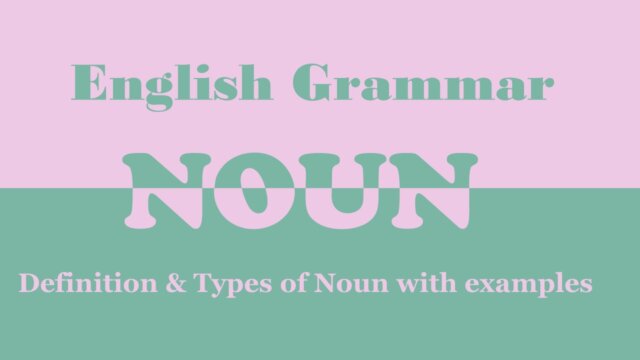Nouns: Definition & Types with Examples: Nouns are an essential component of all aspects of daily life, whether we are speaking, reading, writing, or listening. It is crucial to understand what a word is in order to communicate well. We shall unravel the definition of nouns in this post.
We shall also comprehend different kinds of nouns with the aid of elementary illustrations. This article will help everyone grasp nouns more easily, regardless of whether they are language enthusiasts or someone trying to improve their knowledge of grammar. Let’s begin with a simple definition of a noun.
For example:- Ramesh, House, Delhi, Dog, Affinity, Book etc.
Noun is probably be the very first part of speech you learnt in English grammar. Anything we can touch, see, smell, taste, hear and hold can be nouns. Nouns can act as the subject, an indirect object, a direct object, a subject complement and an object complement. Nouns can also function as adjectives and verbs.
Read More:
Essay On Swachh Bharat Mission
Essay on Pollution Due to Urbanisation
On our website, you may view further fantastic essays, GK questions, and kid-friendly exercises.
Examples of Nouns:
- People – Raju, Seema, Man, Person, Tommy, Women, Girl
- Places – Delhi, India, Mexico, North Pole, South Africa, The Nile River, Classroom, Bedroom, Basketball Court, Cricket Ground, Swimming Pool, School
- Animals/Birds/Aquatic Animals/Reptiles – Tiger, Zebra, Snake, Ostrich, Flamingo, Bear, Cat, Fish
- Ideas – Evolution, Invention, Extinction, Argument, Destruction
- Objects/Things – Bat, Cycle, Curtains, Paper, Bag, Blackboard, Book
We are going to clarify a very common confusion between categories of nouns that many English learners have.
There are 10 Types of Nouns are:
- Common Noun
- Proper Noun
- Singular Noun
- Plural Nouns
- Collective Noun
- Compound Noun
- Concrete Noun
- Abstract Noun
- Uncountable Noun
- Countable Noun
- Common Noun: Common nouns are those nouns that refer to a generic item, group or place. This means that, unlike proper nouns, they are not used to identify specific people, places or objects. Common nouns are not capitalized unless they appear at the beginning of a sentence.
Examples:
- I bought a Flower yesterday. (Common object)
- I am going to school. (Common place)
- Only ten employees showed up to work today. (Common group)
2. Proper Noun: Proper noun are used for name a person, place or thing specifically are called a proper noun. Proper nouns always begin with a capital letter.
Examples:
- My name is Rosy ( Rosy is particular person name)
- This is my dog, Bruno (Bruno is specific pet animal name)
- Rahul came back from Nasik ( Rahul and Nasik both are name of particular person and place name)
3. Singular Noun: These are words that are used to name a single person, place, animal, bird or object.
Examples:
- There is a little boy in front of our house. (Single person)
- That is my daughter. (Single person)
- I found a wounded sparrow in the bush. (Single bird)
4. Plural Nouns: Plural Nouns refer to more than two people, places, animals or things. Nouns are made plural by adding an ‘s’ or ‘es’ or ‘ies’ or ‘ves’ to the existing root word. Nouns that end with an ‘s’ remain the same. Some nouns remain the same in both their singular and plural forms, and some others have very different spelling.
More about Collective Noun
Examples:
- I need some apples.
- Did you find the boxes you were looking for?
- I bought mangoes from the market.
5. Collective Noun: Collective noun is a naming word that is used to denote a group of objects, animals or people.
Example:
Groups of animals
- A pride of lions
- A flock of sheep
- A swarm of bees
- A herd of elephants
Groups of people
- A band of musicians
- A board of directors
- A crew of sailors
- A company of actors
Collective nouns for a number of things/objects
- A pair of shoes
- A chain of mountains
- A fleet of ships
- A bunch of grapes
Names of Animals, Babies and Their Groups
6. Compound Noun: Compound Noun is a noun made of two or more words. These are often referred to as closed or solid compound nouns.
Examples:
Sometimes they are together:
- seafood
- airport
- dishwasher
- moonlight
Joined by a hyphen:
- mother-in-law
- merry-go-round
- self-esteem
- great-grandmother
Sometimes they are two words:
- ice cream
- bus stop
- air conditioner
- potato chip
7. Concrete Noun: Concrete Noun is a type of noun which refer to material and object can be preceived by human senses. Concrete nouns are the “people,” “places,” and “things” in the definition of a noun.
Examples:
- The book is on the table.
- I had a cup of coffee.
- Sharon opened the windows.
8. Abstract Noun: Abstract noun is a any entity that cannot be perceived by the five senses of the human body are called an abstract noun.
Examples:
- Love is a strong emotion.
- Honesty is the best policy.
- It requires a great deal of bravery to speak out against injustice.
9. Uncountable Noun: uncountable noun are those nouns that cannot be counted. Concrete and abstract nouns are included in this category of nouns.
Examples:
- I have a lot of homework to do. (Not specific)
- I have a cup of tea. (Cannot count)
- We are facing terrible weather today. (Cannot count)
10. Countable Noun: are those nouns that can be counted or measured.
Examples:
- Tom brought ten packets of lays for the trip. (specific number – ten)
- Mom asked me to buy a dozen eggs. (specific – dozen means twelve)
- I saw an aeroplane around seven in the morning. (specific – an means one)

